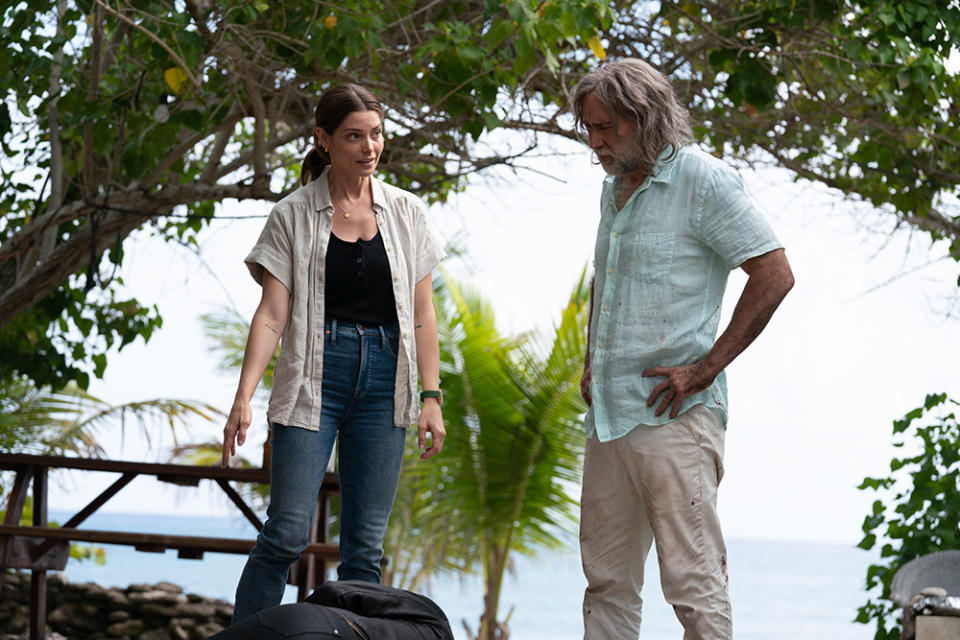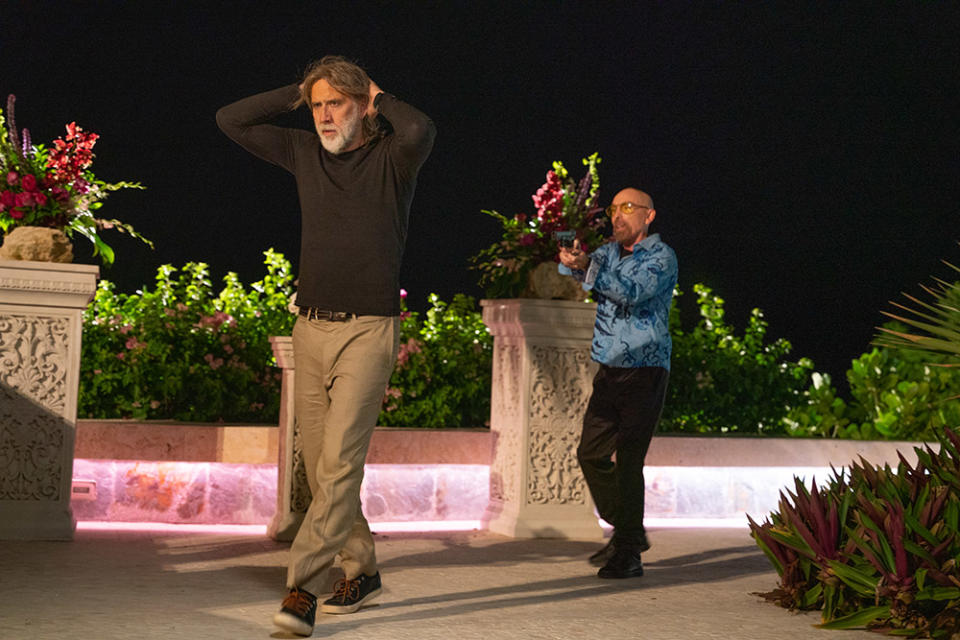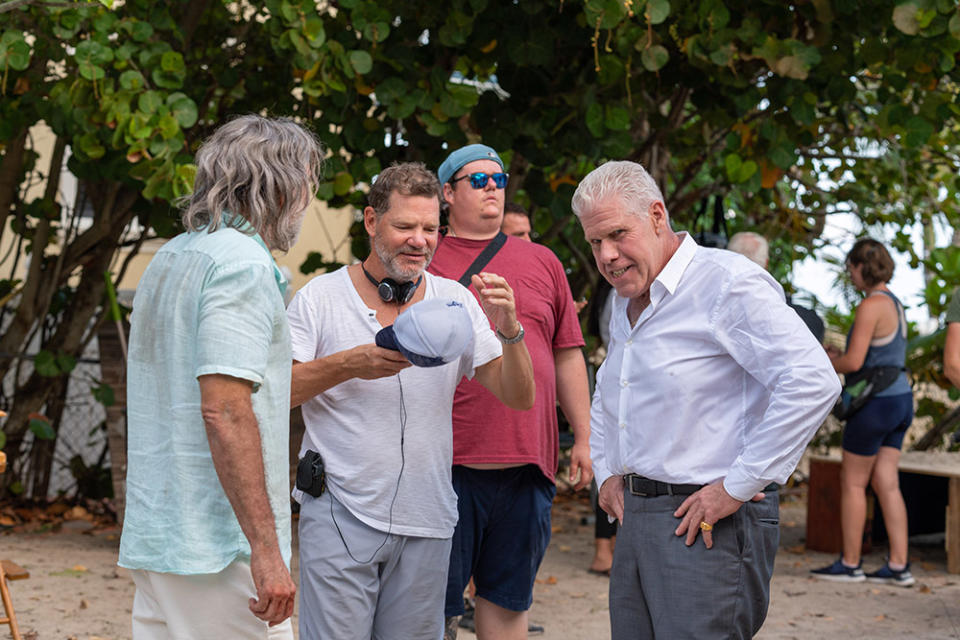‘The Retirement Plan’ Director Tim Brown on Turning Nicolas Cage Into a Beach Bum Assassin and Grandfather
- Oops!Something went wrong.Please try again later.
- Oops!Something went wrong.Please try again later.

The Retirement Plan filmmaker Tim Brown makes his own luck.
Instead of waiting for the phone to ring, the Canadian writer-director has created his own opportunities to helm his written material, and The Retirement Plan, Brown’s new action-comedy starring Nicolas Cage, is the fifth time he’s done just that. Brown already had an usual path to the director’s chair, as he started out on the distribution side of the industry.
More from The Hollywood Reporter
Toronto Awards Analysis: Nicolas Cage Zeroes In on Third Oscar Nomination for 'Dream Scenario'
'Dream Scenario' Review: A Never-Funnier Nicolas Cage in a Savage Satire of Our Click-Driven World
Nicolas Cage's 'Dream Scenario' to Open Zurich Film Festival
The Retirement Plan, which is now playing in theaters, began with Brown imagining John Wick as a 70-year-old former assassin who now passes his time as an island-based beach bum. He eventually sent a script to Cage, and the veteran actor was intrigued by the idea of being aged up by a decade in order to portray the added dimension of an estranged grandfather.
“He loved the idea of playing a grandfather and playing a bit older than his own age,” Brown tells The Hollywood Reporter. “He has an ability to improvise and add just a little twist of something that I refer to as the ‘Nic Cage spice.’ So he brought his Nic Cage-ism to this role in the Caymans with us, and I got really lucky that he liked the material.”
The film not only takes place in the Cayman Islands, but Brown also had the somewhat rare opportunity to shoot there on location. The Cayman Islands has long been depicted as a sanctuary where criminals go to hide their ill-gotten gains from prying eyes, so Brown purposefully bucked that tired stereotype from past movies and TV shows.
“The concept that it’s a haven where you can fly a Cessna in the middle of the night with a hockey bag full of cash and land on some private runway is totally ludicrous,” Brown says. “And I don’t think [the Caymanians] appreciate that idea. Nowadays, it’s something that they probably don’t want to see, so I made sure that all the crime came from Miami and all the good stuff was happening in Cayman.”
Below, during a recent conversation with THR, Brown also discusses how a simple laugh from Cage resulted in his favorite moment in the movie.
So what got the ball rolling on The Retirement Plan? What was the germ of the idea?
I think I asked myself the question of what if John Wick just became a drunk for 30 years on a beach on whatever island he happened to be lying on. And if he was pushing 70, would he still be able to do the John Wick stuff that he used to do and how would that affect his body? So that sort of became the seed of the idea, and then it really evolved from there. [Writer’s Note: Oddly enough, in the original John Wick script known as Scorn, John was 75 years old.]
I like films that open in the middle of a scene. I always find that it keeps you a little more interested in what’s going to happen next. And so I just pictured a woman in an alleyway, in the middle of a crime gone wrong, and it just organically spewed out from there. And then through time, it became the Cayman Islands, as an investor and producing partner of mine was working on getting a bunch of productions going in the Cayman Islands. So I specifically wrote it for that location, and then we ended up making a deal. And lo and behold, I moved down to the Cayman for six months to shoot this.

Shooting in the Cayman Islands, was that a helpful bargaining chip during casting, especially after the isolation of the early pandemic?
Initially, when I was talking to my producer, both he and I thought, “Well, this is great. We’ll just tell these guys that they can come to the island and live Covid-free on a beach for a while and see what that’s like.” And then I remember reading in The Hollywood Reporter that Pierce Brosnan was selling his Malibu house for a hundred million dollars. And then we thought, “They live this life all the time.” So I’m not sure a tropical island was a big convincing factor for them, but it might’ve been. I know Jackie Earle [Haley] had never been, and he was a big fan of the island by the time he left. He fell in love deeply with that place. So he had a great time, as I think everybody did. But with actors, it’s really about the deal and the material at the end of the day. So the location was just a huge bonus, especially being Covid-free.
How difficult was it to get approval to shoot there? It’s obviously not a ubiquitous location like Vancouver, Atlanta, Albuquerque, etc.
Kudos to the producers and the team at Productivity Media. I think they’ve done six films in the Caymans. So they were able to finance it and work with the government. The real tough part, as you pointed out, is that it’s not a production hub. They don’t have a dolly, they don’t have grips, they don’t have an electric department. They might have a generator, but that’s pretty much all you’re getting in the film space. They do have a lot of eager people who live there that are willing to participate, but at the end of the day, if you need a costume designer and wardrobe, you might have to go to Miami to get stuff. So we not only had logistical problems by being on an island, but there was also a 16-day quarantine for everything and everybody that came in.
So the producers were able to deal with all of these logistical issues that kept popping up ten times per day. There were issues trying to bring things in, and weapons, on their own, are a difficult thing to bring into a tropical island without every government official and the police signing off. So from that aspect of it, every single nuance of production had another strain added to it. But thankfully, I had a team of producers that were dealing with all that, so I could focus on the creative and work with the cast.

What was the process of getting Nic Cage on board?
I sent Mike [Nilon], his manager, the script, and he responded. He said that he thought it was really funny. He loved the family theme that’s running through it. He loved the idea of playing a grandfather and playing a bit older than his own age. So he liked the idea of being aged up, and that was pretty much it. We talked a lot about the material, and the comedy really drew him to it. I don’t know if he ever gets enough credit for being a tremendous comic actor because he does so much drama and action, but his comic ability is phenomenal. He has an ability to improvise and add just a little twist of something that I refer to as the “Nic Cage spice.” It’s hard to explain, but you love it. So he brought his Nic Cage-ism to this role in the Caymans with us, as he does in every role that he does, and I got really lucky that he liked the material.
Hollywood has often depicted the Cayman Islands as a place where American criminals hide their money from the government. And while the Cayman Islands still might be a tax haven in that regard, there’s very little crime there. In your case, American criminals travel there to retrieve a flash drive, so I don’t count your movie as part of this. But were you able to get a read on whether the Caymanians take issue with their homeland’s overall depiction in movies and TV shows?
100 percent. I think Sydney Pollock and Tom Cruise did that with Holly Hunter at the very end of The Firm, and that was really the time. It was in an era where maybe that was more prevalent, but with the banking laws today, you’d have a hard time even getting an account in the Cayman Islands. So it’s a totally different world now. And the concept or the stereotype that it’s a haven where you can fly a Cessna in the middle of the night with a hockey bag full of cash and land on some private runway is totally ludicrous. And I don’t think they appreciate that idea. Nowadays, it’s something that they probably don’t want to see, so I made sure that all the crime came from Miami and all the good stuff was happening in Cayman. So I was very conscious of it all, and I didn’t want to portray [the Caymanians] as being exactly what they didn’t want to be portrayed as. And I had no problem with that because it’s the truth.
Directors can often identify the exact takes that their actors are most effective. What was Nic’s wheelhouse, usually?
I was always a fan of take three. I think take one is just getting comfortable with the dialogue and also feeling out how someone is playing against you. We didn’t have rehearsal, so the first time he did a take was really the first time. I might have run a couple before we rolled, but the only rehearsal was when we had cameras on set. We, unfortunately, didn’t get that leisure time with those guys to do that. But I always found that Nic is great out of the gate and he finds more improvisation and looseness in the more takes that he does.
Jackie was very different. Ron [Perlman] would like take one as much as possible, but I always thought Ron was really good on take two. Ashley [Greene] was always bringing it, but Jackie Earle would run three takes in a row. So I would just roll a scene and then I wouldn’t cut, and we would start again. He would go back to first position and we would keep going, because he wanted to feel where his character was at certain points in time and mix it up. So cutting and resetting for him, I almost felt like a boxer in the corner who’s ready to jump into the ring. So everyone had their own thing.
Ron had it the toughest because he was wearing a suit in 98 degree-weather while fighting somebody in an action scene on the beach. So we just kept him right by camera, in an air-conditioned car, because the moment the guy stepped outside, it was a steam bath. He would burst into sweat the moment he got outside, so we had to keep him cool. He was like, “Let’s shoot the rehearsal. Let’s try and get this as quick as we can,” so we could get him back in air conditioning. (Laughs.)
I love Kubrick and I love Fincher. But the idea of doing 50 takes of a guy walking through a door or something like that, I just don’t know how much better take 49 would be than take three, where it would be like, “Thank God we just spent the whole day doing that because take 49 of walking through that door is going to be the one.” So I don’t believe that Nic is a big fan of doing a million takes either. He was really good out of the gate and we found a nice rhythm, but if I needed takes five and six, there was usually a technical problem. Plus, it’s an independent film. I didn’t have a lot of time. We were shooting seven or eight pages on some days, so you’ve got to move.

What day on set best sums up your Nic Cage experience? What day will you likely recall a decade from now?
I think it’d be the day that we were shooting the balcony scene, and his daughter [Ashley Greene] says, “Are you some kind of assassin or something?” And I had written a line for that moment, but Nic turned to me and said, “What if I didn’t say anything and just looked at her and [sheepishly laughed]?” (Brown mimics Cage’s character’s laugh.) It was something that only he can do, and to this day, it’s the highlight of the film for me, because it shows how great he is at doing nothing except a little expression. It just added so much to it. So that would probably be my most memorable day.
But every day, I was super grateful to be with everybody, from Jackie to Ernie Hudson. Grace Byers was fantastic. What a pro. She was just so on point. I mean, there’s a TV professional, for sure. She never missed anything. One day, we shot four pages in one scene with her walking and talking, and that’s a lot of dialogue. But she never had a problem with it, and she just whipped through it. So I was super lucky.
I believe you shot The Retirement Plan in the spring of 2021, which was shortly before Nic’s movie Pig came out. So what made everyone hold off on releasing the film for a couple years?
That was totally out of my control. We delivered the film, and then it had to fit into a distribution slate that worked for the investors, the distribution company and whether or not it was going theatrical or straight to video. So there were all of those normal elements of a release plan, but Covid made everything longer. So all of that added time to it, but we were certainly ready to roll a while ago. It feels like it’s been a long time.
You started Joker Films a number of years ago, and you worked primarily in distribution and sales. What prompted the jump to the director’s chair?
Well, this is my fifth feature now, and I started out in the early ‘90s, selling VHS tapes to Blockbuster and Rogers [Video]. I worked for a guy named René Malo, who was a pretty famous producer here in Canada. The Decline of the American Empire was his. And so I worked for him and a guy named Noah Siegel for a while. I also went to the American Academy of Dramatic Arts. I tried to act for a while, but it was always with the intent of getting behind the camera as a director. And then Noah said, “Well, if you get in the business of film, you can learn about how that works. And then you’re probably just as likely to get the chance to direct by going through this route.” But I don’t know anyone who’s gone from distribution to being a director. It’s not a normal path. So I don’t know if it’s the right or wrong way to do it, but it’s how I evolved and got into the director’s chair.
Lastly, what’s your take on the double strike? How’s it affecting your corner of the industry?
Well, I’m afraid as a writer. A friend of mine, who runs a company that does a lot of AI work, has computers that read screenplays and spit out information that’s pertinent to a writer. And when you read what the AI comes back with, it’s shocking that it’s not horrific. And I think that AI is only going to get better as they figure it out. So, as a writer, I’m utterly terrified of AI, because it’s not going to get worse at what it does. It’s only going to keep improving. So, until then, I’m just trying to get as many original ideas out as possible and then find ways to get behind the camera to direct, which is the ultimate goal, of course. The Retirement Plan is my fifth feature, and on every one of them, I’ve had to figure out how to get myself hired. No one’s ever wanted to hire me. (Laughs.) So maybe after this one, someone might call me instead of me calling them. But it’s brutal right now.
And then from the actor’s perspective, you see these deep fakes online, and it’s scary. You don’t know anymore if what you’re looking at is legitimate or not. For actors, their whole value is their face, and the fact that someone can just recreate it somewhere else is terrifying. And like AI, that technology is only going to get better at what it does. So [the guilds] have a lot to keep fighting for, and I certainly wish them all the best. Technology is pretty scary right now.
***
The Retirement Plan is now in theaters. This interview was edited for length and clarity.
Best of The Hollywood Reporter
Kim Cattrall and Five Actors Who Made Surprising Returns to a Role
10 Times Hollywood Predicted the Scary (or Not So Scary) Future of AI
21 Actors Who Committed to Method Acting at Some Point in Their Career

